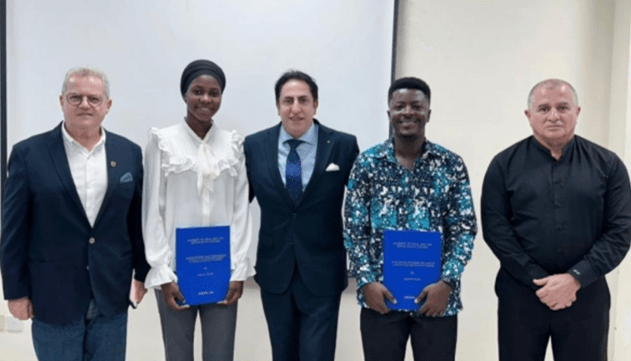By Ernest Bako WUBONTO
the Lebanese Community Scholarship Programme, an initiative to support brilliant but needy students and research work, marks its 10th anniversary in collaboration with the University of Media, Arts and Communication Institute of Journalism (UniMAC-IJ).
The scholarship programme, established a decade ago, has supported hundreds of students at both undergraduate and postgraduate levels, providing them with the tools to contribute to nation-building.
The commemoration was held concurrently with the third edition of its mini-research seminar for beneficiaries, aimed at enhancing the professional skills of post-graduate students while fostering educational cooperation between Ghana and Lebanon.
The scholarship beneficiaries for this year delivered insightful academic presentations on comparative studies between Lebanon and Ghana, addressing topics such as community journalism and corporate social responsibility. The research was presented by Rashida Uzstarz and Richard Hakim.
The seminar’s focus on cross-cultural research reflects the programme’s broader goals of fostering intellectual curiosity and academic collaboration.
Dean of the School of Graduate Studies and Research (SoGSAR), Dr. George Asamoah, enlightened the audience that the seminar was initiated as a platform for students to share research findings and strengthen the relationship between Ghana and Lebanon.
“We see this seminar as a platform providing a unique opportunity for students to present their work to academia and Lebanese communities. It also reinforces the cultural and educational partnership that continues to grow between our nations,” he stressed.
Lebanese Ambassador to Ghana, Maher Kheir, commended the students for their efforts, emphasising the importance of research in broadening their perspectives as future communication professionals.
“While I applaud your research on Ghana and Lebanon, I urge you to explore new horizons… The Lebanese presence in Ghana, which dates back to 1886, has significantly contributed to the country’s economic sectors, including hospitality, real estate and manufacturing, among other critical sectors,” he said.
The ambassador also announced plans to operationalise the Lebanese Scholarship Alumni Network (LESAN), which will serve as a platform for workshops, skill development programmes and community projects.
He said this will further open opportunities for students to intern at the Lebanese Embassy.
Naaman Ashkar, representing the Lebanese community, praised the students’ research, emphasising its practical value for Lebanese businesses in Ghana. “This seminar proves that our investments in education are yielding meaningful results. It is a testament to the potential of cross-cultural collaboration,” he iterated.
LESAN Launch
This year’s seminar also celebrated the official launch of the Lebanese Scholarship Alumni Network (LESAN), a social impact organisation that fosters alumni engagement and undertakes humanitarian projects to enhance society.
As the Lebanese Community Scholarship Programme enters its second decade, the collaboration between UniMAC-IJ and the Lebanese community is expected to deepen, creating more academic and professional development opportunities for Ghanaian students.










